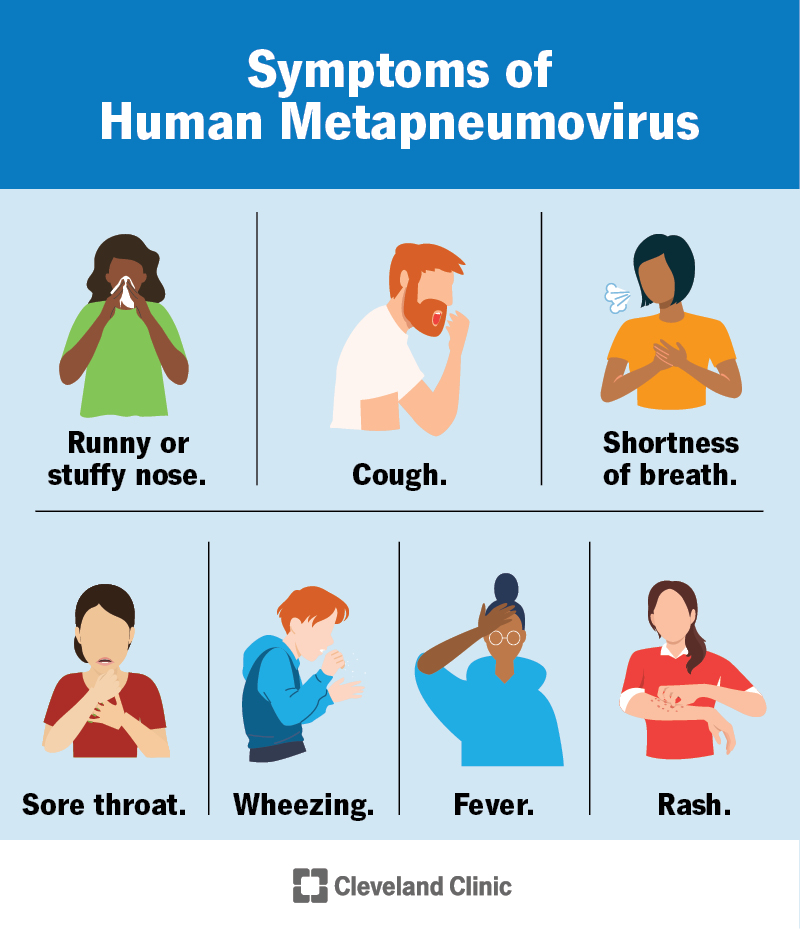Human metapneumovirus (HMPV) is a virus that usually causes symptoms similar to a cold. You might cough or wheeze, have a runny nose or a sore throat. Most cases are mild, but young children, adults over 65 and people with weakened immune systems are at a higher risk for serious illness. HMPV is common — most people get it before they turn 5.
Advertisement
Cleveland Clinic is a non-profit academic medical center. Advertising on our site helps support our mission. We do not endorse non-Cleveland Clinic products or services. Policy

Image content: This image is available to view online.
View image online (https://my.clevelandclinic.org/-/scassets/images/org/health/articles/22443-human-metapneumovirus)
Human metapneumovirus (HMPV) is a virus that usually causes symptoms similar to the common cold. It often causes upper respiratory infections, but it can sometimes cause lower respiratory infections like pneumonia, asthma flare-ups or make chronic obstructive pulmonary disease (COPD) worse. HMPV infections are more common in the winter and early spring.
Advertisement
Cleveland Clinic is a non-profit academic medical center. Advertising on our site helps support our mission. We do not endorse non-Cleveland Clinic products or services. Policy
Most people get HMPV before they turn 5. You can get HMPV again, but symptoms are usually mild after your first infection.
Human metapneumovirus most often causes symptoms similar to a cold, but some people can get very sick. You’re more likely to get severely sick the first time you get HMPV, which is why young kids have a greater risk for serious illness. You get some protection (immunity) from your first infection and then are more likely to have mild, cold-like symptoms if you get another HMPV infection. Adults over 65 and people with breathing problems or a weakened immune system may also get severe symptoms.
Researchers estimate that about 10% to 12% of respiratory illnesses in children are caused by HMPV. Most cases are mild, but about 5% to 16% of children will develop a lower respiratory tract infection like pneumonia.
It’s not the same, but human metapneumovirus is similar to RSV (respiratory syncytial virus). It’s part of the same genus — or scientific grouping — as RSV (Pneumovirus), and can cause similar symptoms. The peak age for severe illness from HMPV is between 6 and 12 months, but RSV is more likely to cause severe illness in infants younger than 6 months.

Image content: This image is available to view online.
View image online (https://my.clevelandclinic.org/-/scassets/images/org/health/articles/22443-human-metapneumovirus)
Symptoms of human metapneumovirus include:
Advertisement
A virus — a small germ that uses your cells to make more copies of itself — causes HMPV. It’s part of the same group of viruses that cause RSV, measles and mumps.
HMPV spreads through direct contact with someone who has it or from touching things contaminated with the virus. For instance:
Anyone can get HMPV, but you’re at a higher risk for severe illness if you:
Sometimes HMPV causes complications. These might be serious and require you to be hospitalized. They include:
Healthcare providers usually diagnose HMPV based on your symptoms and health history. They might use a soft-tipped stick (swab) to get a sample from your nose or throat. A lab tests the sample for viruses and other infections. Keep in mind that you probably won’t be tested for HMPV unless you have serious symptoms.
Sometimes, your provider may also do a bronchoscopy or chest X-rays to look for changes in the airways of your lungs.
There aren’t any antiviral medications that treat human metapneumovirus. Most people can manage their symptoms at home until they feel better.
If you or your child are severely ill, you might need to be admitted to the hospital. There, healthcare providers can monitor your condition and help prevent you from getting sicker. They might treat you with:
No. Antibiotics only treat bacteria. Since HMPV is a virus, antibiotics won’t get rid of it. Sometimes people who get pneumonia from HMPV also get a bacterial infection at the same time (secondary infection). If your provider prescribes antibiotics, it would be to treat any secondary infections.
Mild cases of human metapneumovirus usually last a few days to a week. If you’re very sick, it’ll probably take longer to feel better. You might also have lingering symptoms, like a cough, that take longer to go away.
Advertisement
You can manage mild, cold-like symptoms of HMPV at home by:
Contact a healthcare provider if:
Go to the ER or seek immediate medical attention if you or your child has symptoms of severe illness, including:
It might be helpful to ask your healthcare provider:
Advertisement
You can reduce your risk of getting HMPV and other infectious diseases by:
Human metapneumovirus (HMPV) is a common virus that usually causes symptoms similar to a cold. If you’re older than 5, you’ve probably already had it at least once. Most of the time, you’ll get better at home in a few days. But sometimes HMPV can cause serious complications. Young children, adults over 65 and people with weakened immune systems are at a higher risk for severe illness. Talk to your healthcare provider if you have any concerns about HMPV. Seek medical care right away if you or your child is having trouble breathing or if you have other signs of serious illness.
Advertisement

Sign up for our Health Essentials emails for expert guidance on nutrition, fitness, sleep, skin care and more.
Learn more about the Health Library and our editorial process.
Cleveland Clinic's health articles are based on evidence-backed information and review by medical professionals to ensure accuracy, reliability, and up-to-date clinical standards.
Cleveland Clinic's health articles are based on evidence-backed information and review by medical professionals to ensure accuracy, reliability, and up-to-date clinical standards.
Need care fast? Cleveland Clinic’s Express Care and Urgent Care locations treat everything from sprains to sinus infections — no appointment needed.
